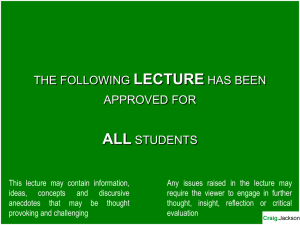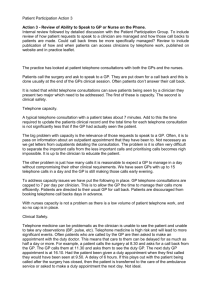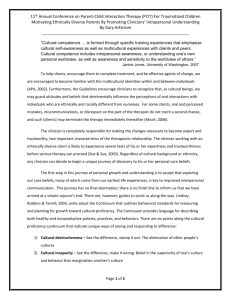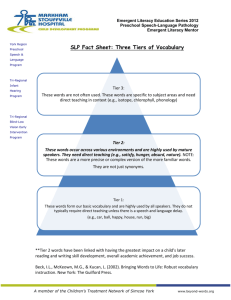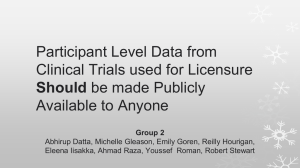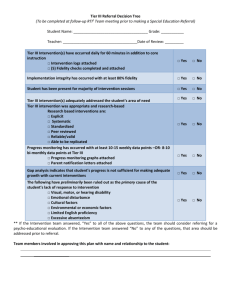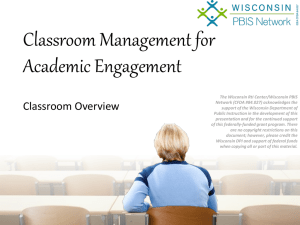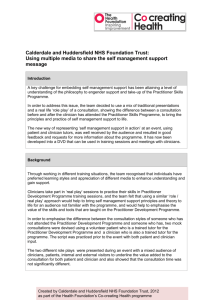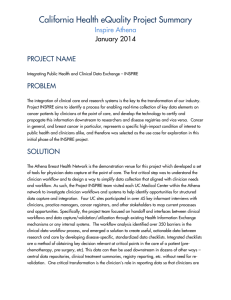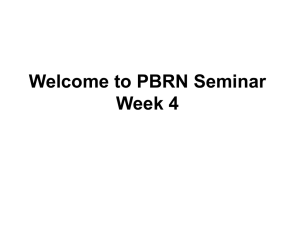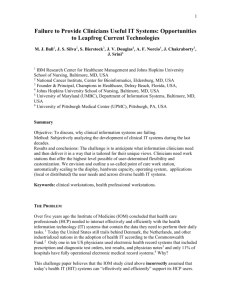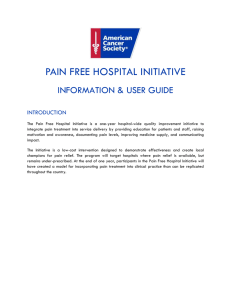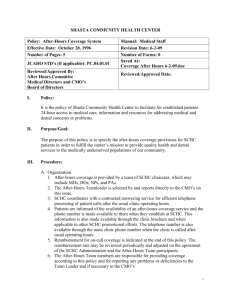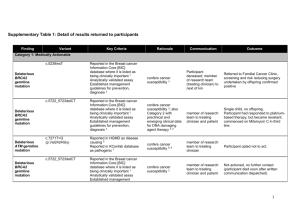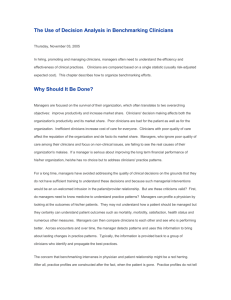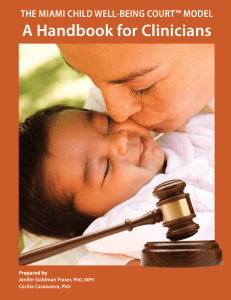VTPBiS and Success Beyond Six
advertisement
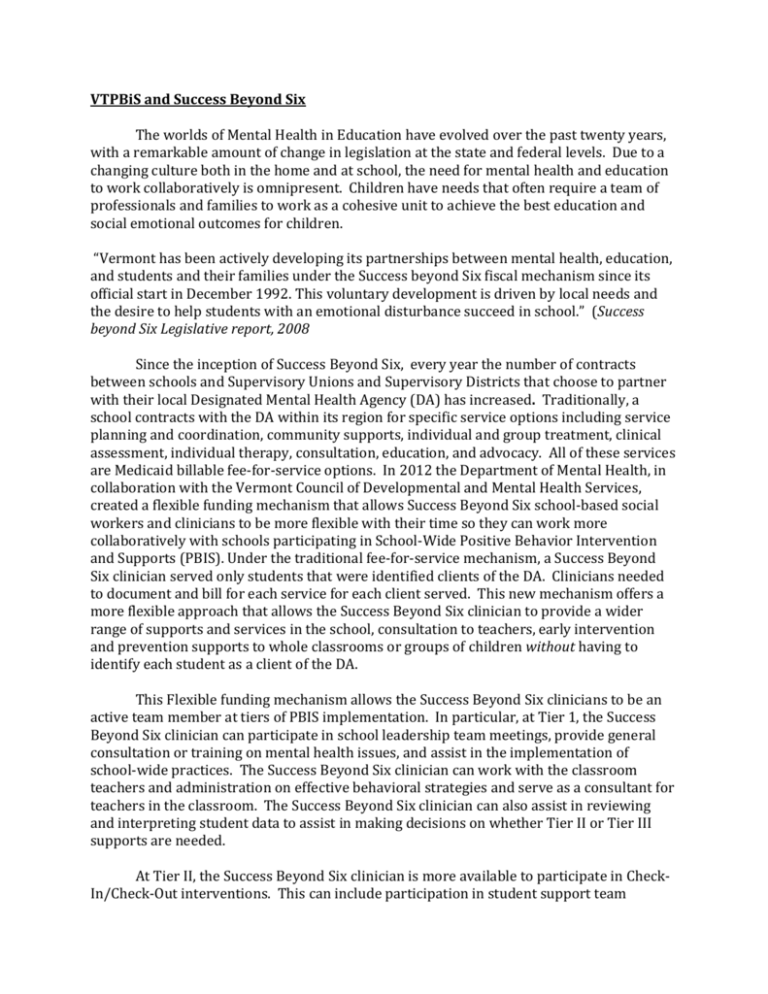
VTPBiS and Success Beyond Six The worlds of Mental Health in Education have evolved over the past twenty years, with a remarkable amount of change in legislation at the state and federal levels. Due to a changing culture both in the home and at school, the need for mental health and education to work collaboratively is omnipresent. Children have needs that often require a team of professionals and families to work as a cohesive unit to achieve the best education and social emotional outcomes for children. “Vermont has been actively developing its partnerships between mental health, education, and students and their families under the Success beyond Six fiscal mechanism since its official start in December 1992. This voluntary development is driven by local needs and the desire to help students with an emotional disturbance succeed in school.” (Success beyond Six Legislative report, 2008 Since the inception of Success Beyond Six, every year the number of contracts between schools and Supervisory Unions and Supervisory Districts that choose to partner with their local Designated Mental Health Agency (DA) has increased. Traditionally, a school contracts with the DA within its region for specific service options including service planning and coordination, community supports, individual and group treatment, clinical assessment, individual therapy, consultation, education, and advocacy. All of these services are Medicaid billable fee-for-service options. In 2012 the Department of Mental Health, in collaboration with the Vermont Council of Developmental and Mental Health Services, created a flexible funding mechanism that allows Success Beyond Six school-based social workers and clinicians to be more flexible with their time so they can work more collaboratively with schools participating in School-Wide Positive Behavior Intervention and Supports (PBIS). Under the traditional fee-for-service mechanism, a Success Beyond Six clinician served only students that were identified clients of the DA. Clinicians needed to document and bill for each service for each client served. This new mechanism offers a more flexible approach that allows the Success Beyond Six clinician to provide a wider range of supports and services in the school, consultation to teachers, early intervention and prevention supports to whole classrooms or groups of children without having to identify each student as a client of the DA. This Flexible funding mechanism allows the Success Beyond Six clinicians to be an active team member at tiers of PBIS implementation. In particular, at Tier 1, the Success Beyond Six clinician can participate in school leadership team meetings, provide general consultation or training on mental health issues, and assist in the implementation of school-wide practices. The Success Beyond Six clinician can work with the classroom teachers and administration on effective behavioral strategies and serve as a consultant for teachers in the classroom. The Success Beyond Six clinician can also assist in reviewing and interpreting student data to assist in making decisions on whether Tier II or Tier III supports are needed. At Tier II, the Success Beyond Six clinician is more available to participate in CheckIn/Check-Out interventions. This can include participation in student support team meetings and support for individual students. Tiffany Hubbard, the School Services Director at WCMH, stated, “The Success Beyond Six clinician has been able to work more with the identified students. With students that need more than Tier II supports but do not need Tier 3 (supports), the School based clinicians have been able to create the behavior support plans, assist in training the para-educators and classroom support staff on the plans, and provide assistance to teachers on creating classroom-wide behavior support plans using responsive classroom and stimulus control techniques.” At Tier III, the Success Beyond Six clinician has the flexibility to play a vital role in completing functional behavioral assessments, developing behavioral support plans, and facilitating or training Wraparound teams. Family interventions and individual treatment is more likely needed at this level and may require more involvement from the Success Beyond Six clinician. When asked about how the Success Beyond Six flexible funding mechanism has impacted the DA’s service delivery in schools, LuAnn Chiola from Counseling Services of Addison County wrote “It has opened up opportunities for clinicians to provide additional support services for schools, such as: Providing consultation and sharing clinical expertise around students not on our caseloads, Participating in PBIS teams that explore and implement changes to school culture; Aligning discipline procedures and protocols, data review and analysis; Facilitating wraparound teams and small groups; Partnering with teachers or guidance counselors on such topics as bullying, relationships, mediation/conflict resolution, and other skill building topics; and Training for school staff on such topics as mental health diagnoses, group work skills, school-wide crisis intervention support. These activities at times have included students that are not on our caseloads.” As you can see, the flexible funding mechanism creates a lot of new and expanded services to support VTPBiS schools. If you have any questions about the Success Beyond Six programming please contact your local community mental health center. Tracey Mongeon, MS , Children’s Mental Health Care Manager Child, Adolescent & Family Unit Department of Mental Health Tracey.mongeon@state.vt.us
